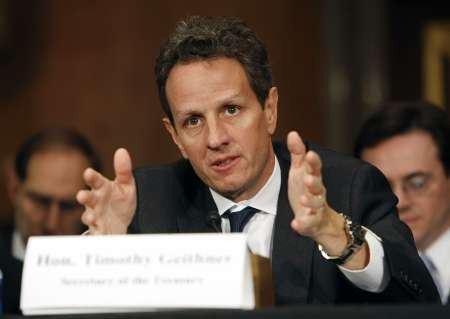Geithner Stays at Treasury: Five Things He Now Needs to Do
Analysis

Treasury Secretary Timothy Geithner has assured President Obama that he will keep his position through the President's current term, despite calls for him to resign in light of the S&P downgrade. But he's got quite the challenge in front of him, considering the state of America's economy.
Now that Geithner has decided to stay on, here are five things he needs to make priorities before his expected departure at the end of 2012.
1) Fix the Jobs Crisis
The United States' unemployment rate sits at 9.1 percent, as the country has been unable to produce enough new jobs to offset unemployment two years after the official end to the recession. Geithner has to make it a priority to fix the unemployment rate and get new jobs out on the market, and not simply through TARP-like stimulus bills.
One measure could be through territorial tax cuts -- which we'll delve into in a moment -- but Geithner needs to consider as many options as possible to fix the omnipresent issue. It could be putting major pressure on Obama and Congress to pass regulatory policy changes, or to get large infrastructure projects under way, such as a high-speed rail system, but whatever the route, the pressure will be on Geithner to provide some solution for America's lingering unemployment problem.
2) Cut More Federal Spending
Initially, Geithner had stated he would leave his position after Congress passed legislation to raise the debt ceiling. But after a bipartisan effort only cut approximately $1.5 trillion in spending over the next 10 years, he has to apply pressure for more cuts. Rating agencies such as Standard & Poor's want to see the United States cut $4 trillion over the next 10 years, or else it could face further downgrade from its current AA+ rating.
Geithner needs to effectively pressure the planned 12-member congressional "supercommittee" on further cuts and make sure it finds a way to reach $4 trillion.
Otherwise the United States could stand to face further downgrades from S&P, and other raters such as Moody's and Fitch, which could have major lasting effects on the economy, starting with much higher borrowing costs.
3) Offer Territorial Tax Cuts
One way to create more jobs and money for the United States could be through territorial tax cuts. Currently, when a company wants to repatriate profits into the United States, it faces a tax as high as 35 percent.
But if the United States were to lower that tax, it could generate as many as 300,000 new jobs and $1 trillion in extra revenue, economist Allen Sinai estimated in The Wall Street Journal.
These cuts would help solve Geithner's biggest issues of generating more jobs, while also bringing in additional revenue. In February he stated he'd consider territorial tax cuts if "the ultimate outcome supports the objective."
Sen. Charles Schumer, D-N.Y., is in favor of one-time territorial tax cuts in 2012, though if Geithner wants to solve the major issues surrounding the economy, he would be wise to pursue long-term cuts. It would make the United States and its businesses more competitive, which is important in the current markets.
4) Build Consensus Among Congressional Leaders
One of the reasons S&P cited in its rationale in downgrading the United States' debt rating was the tenuous solution Congress reached after 11th-hour debt ceiling debates. Republicans and Democrats alike bickered for months about raising the debt ceiling, ultimately leading S&P to question the country's financial future based on an unstable political environment.
Geithner needs to be better at selling his policies in order to build a stronger consensus among congressional leaders. If he can't sell his policies to Capitol Hill, there is no chance those leaders in turn will try to sell it to their constituents.
"Congress ultimately owns the credit rating of the United States," Geithner said in an interview after S&P's announcement.
If that's true, then Geithner needs to do a better job at influencing Congress. Right now, he has an opportunity to make major policy changes, as many elected officials will be motivated to rectify the downgrade situation.
The important thing is Geithner will have to sell them on the right policies and bring them together; otherwise more downgrades could occur if no consensus can be reached.
5) Deal with Global Economic Concerns
In March, Geithner told the G-20 summit that inconsistency in exchange rates is the biggest issue facing the international monetary system.
"We have been engaged in a careful multilateral effort in the G20 to establish stronger norms for exchange rate policy," he said.
Geithner and the United States have been working with six other powerful nations, as part of the Group of Seven, toward ensuring global liquidity. They are trying to avert a repeat of the global recession that started in 2008 -- though there has been recent talk among economists of a double-dip recession in the United States.
Geithner must work to make sure that European financial meltdowns don't trigger more aftershocks in the United States, while maintaining a stable relationship with China.
China last week stated that the United States needed to cure its addiction to debt, though in recent interviews Geithner has almost scoffed at those comments, seeming certain that the Chinese will keep investing heavily in U.S. debt.
But Geithner needs to take the correct measures to ensure that China continues to heavily invest, as a major selloff by China could further shake the economy.
© Copyright IBTimes 2025. All rights reserved.





















